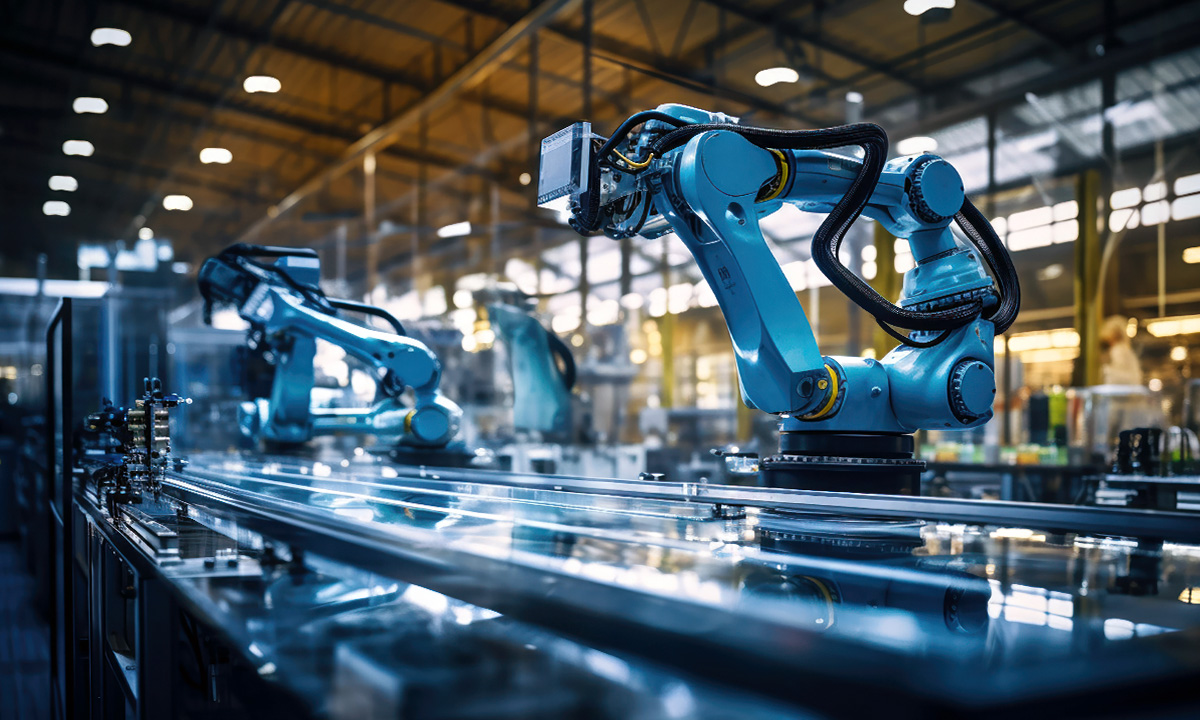In the ever-evolving landscape of industrial settings, the integration of automation equipment stands as a game-changer. As technology continues to advance at a rapid pace, custom automation solutions have become indispensable in enhancing efficiency, productivity, and safety across various industries.
From manufacturing to healthcare, automation equipment has revolutionized operations by streamlining processes and ensuring consistency in quality output. Join us on this exploration of the benefits and applications of automation equipment in today's dynamic industrial environments.
The Benefits of Using Automation Equipment in Today's Industrial Settings
Automation equipment in industrial settings offers increased efficiency, improved safety measures, consistent product quality, reduced labor costs, and positive environmental impacts. These advancements redefine the way industries operate, paving the path for enhanced productivity and sustainability across diverse sectors.
Custom Automation Solutions
Custom automation solutions are tailored to meet specific industrial needs. By designing and implementing automation equipment based on unique requirements, companies can optimize processes, enhance efficiency, and increase productivity. Customization allows for a more precise fit to the operational environment, leading to improved outcomes.
Manufacturing Solutions
Manufacturing solutions play a crucial role in industrial settings by streamlining production processes. Automation equipment enhances efficiency and accuracy, leading to increased productivity. By incorporating custom automation solutions tailored to specific manufacturing needs, companies can optimize their operations for better results.
Labelers
Labelers are essential automation equipment used in industrial settings to accurately apply labels onto products. They help streamline the labeling process, ensuring consistency and efficiency in product identification. Labelers come in various types, such as automatic, semi-automatic, and print-and-apply systems.
Types of Automation Equipment
Automation equipment comes in various forms to cater to different industrial needs. Some popular types include FLEXBASE for flexible manufacturing, Heat Stake for thermal assembly processes, and OEE Optimizer® for overall equipment efficiency improvement. Each type offers unique features and benefits to enhance operational efficiency.
FLEXBASE
FLEXBASE is a versatile automation solution ideal for various industrial applications. It offers customizable features to adapt to specific production needs, enhancing efficiency and productivity. Its flexibility allows for seamless integration into existing manufacturing processes, making it a valuable asset in today's industrial settings.
Heat Stake
Heat Stake is a type of automation equipment utilized in industrial settings to join plastic components. By applying heat and pressure, Heat Stake machines can melt the plastic parts together, creating a secure bond. This process ensures precise and efficient assembly of products in manufacturing operations.
OEE Optimizer®
The OEE Optimizer® is a cutting-edge automation solution that focuses on maximizing Overall Equipment Effectiveness (OEE) in industrial settings. By continuously monitoring and analyzing key performance indicators, this advanced system helps optimize production efficiency and identify areas for improvement.
Advantages of Automation Equipment
Automation equipment offers several advantages in industrial settings. It increases efficiency and productivity by streamlining processes. Automation enhances safety by reducing human error. Consistency in product quality is achieved through automated precision. Labor costs are minimized, and automation promotes sustainability with positive environmental impacts.
Increased Efficiency and Productivity
Automation equipment significantly boosts efficiency and productivity in industrial settings. By automating repetitive tasks, production processes become faster and more streamlined. This leads to increased output with fewer errors, ultimately improving overall operational performance within the industry.
Improved Safety
Automation equipment plays a crucial role in enhancing safety standards within industrial environments. By replacing manual labor with automated processes, the risk of accidents and injuries is significantly reduced. This improved safety not only protects workers but also ensures a more secure working environment overall.
Consistency in Product Quality
Consistency in product quality is a crucial aspect of manufacturing. Automation equipment ensures that products are made to the same high standards every time, reducing variability and defects. This reliability leads to increased customer satisfaction and loyalty in industrial settings.
Reduced Labor Costs
Reduced labor costs are a significant advantage of automation equipment in industrial settings. By automating repetitive tasks, businesses can decrease the need for manual workforce, leading to cost savings and increased efficiency. This financial benefit makes automation an attractive investment for companies looking to streamline operations.
Sustainability and Positive Environmental Impact
Automation equipment plays a crucial role in promoting sustainability and positively impacting the environment. By optimizing processes and reducing waste, automation helps industries operate more efficiently and with less resource consumption. This leads to a significant reduction in carbon footprint and overall environmental impact.
Applications of Automation Equipment
Automation equipment finds diverse applications across various industries including manufacturing, logistics and warehousing, agriculture, healthcare, construction, and energy sectors. From streamlining production processes to enhancing safety measures, the versatility of automation equipment continues to revolutionize modern industrial settings.
Manufacturing
Manufacturing industries benefit greatly from automation equipment. Automated systems streamline production processes, reduce errors, and enhance efficiency. With the use of advanced technology, manufacturers can optimize their operations and meet increasing demands in today's competitive market.
Logistics and Warehousing
With the rapid growth of e-commerce, automation equipment plays a crucial role in optimizing logistics and warehousing processes. From automated sorting systems to robotic palletizers, these technologies streamline operations, increase efficiency, and enhance order accuracy in warehouse settings.
Agriculture
Automation equipment plays a crucial role in the agricultural sector, revolutionizing traditional farming methods. From automated tractors for plowing to robotic harvesters for picking crops, automation technology enhances efficiency and precision in agriculture operations, leading to increased productivity and reduced labor costs.
Healthcare
Automation equipment plays a crucial role in the healthcare industry by streamlining processes, such as medication dispensing and surgical procedures. Automated systems can enhance patient safety, reduce human errors, and improve overall efficiency in hospitals and medical facilities.
Construction
In the construction industry, automation equipment plays a vital role in enhancing efficiency and safety. From robotic bricklayers to automated cranes, these technologies streamline processes and minimize human error on job sites. Building projects benefit immensely from the precision and speed offered by automation solutions.
Energy
The energy sector is rapidly adopting automation equipment to enhance operational efficiency and safety. From smart grid management to renewable energy production, automation technologies play a crucial role in optimizing processes and ensuring sustainable practices within the industry.
Choosing Appropriate Automation Equipment
When it comes to selecting the right automation equipment for your industrial needs, consider factors such as functionality, compatibility with existing systems, ease of integration, and long-term maintenance requirements. Automatic screwdrivers, industrial robots, and robotic system integrators are key options to explore for enhanced efficiency and productivity.
Automatic Screwdrivers
Automatic screwdrivers are essential automation equipment in industrial settings. They efficiently and accurately tighten screws, saving time and ensuring precision. These tools improve productivity by automating repetitive tasks that would otherwise be time-consuming for workers on the assembly line.
Industrial Robots
Industrial robots are a type of automation equipment designed to perform tasks traditionally carried out by humans in industrial settings. These robots can handle repetitive and labor-intensive jobs with precision and efficiency, contributing to increased productivity and improved safety in manufacturing facilities.
Robotic System Integrators
Robotic system integrators play a crucial role in designing and implementing automation solutions tailored to specific industrial needs. These professionals specialize in integrating various robotic technologies seamlessly into existing production processes, optimizing efficiency, and maximizing productivity. Their expertise ensures seamless operation and effective utilization of automation equipment.
Future of Automation Equipment
The future of automation equipment looks promising with advancements in technology like cobots and collaborative robots enhancing efficiency. Warehouse automation and automated guided vehicles are revolutionizing industrial settings, paving the way for increased productivity and streamlined operations.
Cobots and Collaborative Robots
Cobots and collaborative robots are revolutionizing industrial settings by working alongside humans. These advanced machines are designed to enhance productivity, safety, and efficiency in various tasks. With their ability to collaborate with workers, cobots offer a flexible and user-friendly automation solution.
Warehouse Automation
Warehouse automation has revolutionized the way goods are stored, picked, and shipped in industrial settings. By utilizing automated systems like conveyor belts, robotic arms, and inventory management software, warehouses can streamline operations, minimize errors, and increase efficiency significantly. This technology is paving the way for a more optimized supply chain process.
Automated Guided Vehicles
Automation equipment has revolutionized industrial settings across various sectors, providing significant advantages in terms of efficiency, safety, quality control, cost-effectiveness, and sustainability. As technology continues to advance rapidly, the future of automation equipment looks promising with innovations like cobots and collaborative robots for enhanced human-robot interaction, warehouse automation systems for streamlined logistics operations, and automated guided vehicles for efficient material handling within industrial facilities. Embracing these cutting-edge technologies will undoubtedly drive further optimization and productivity in modern industrial environments.

























